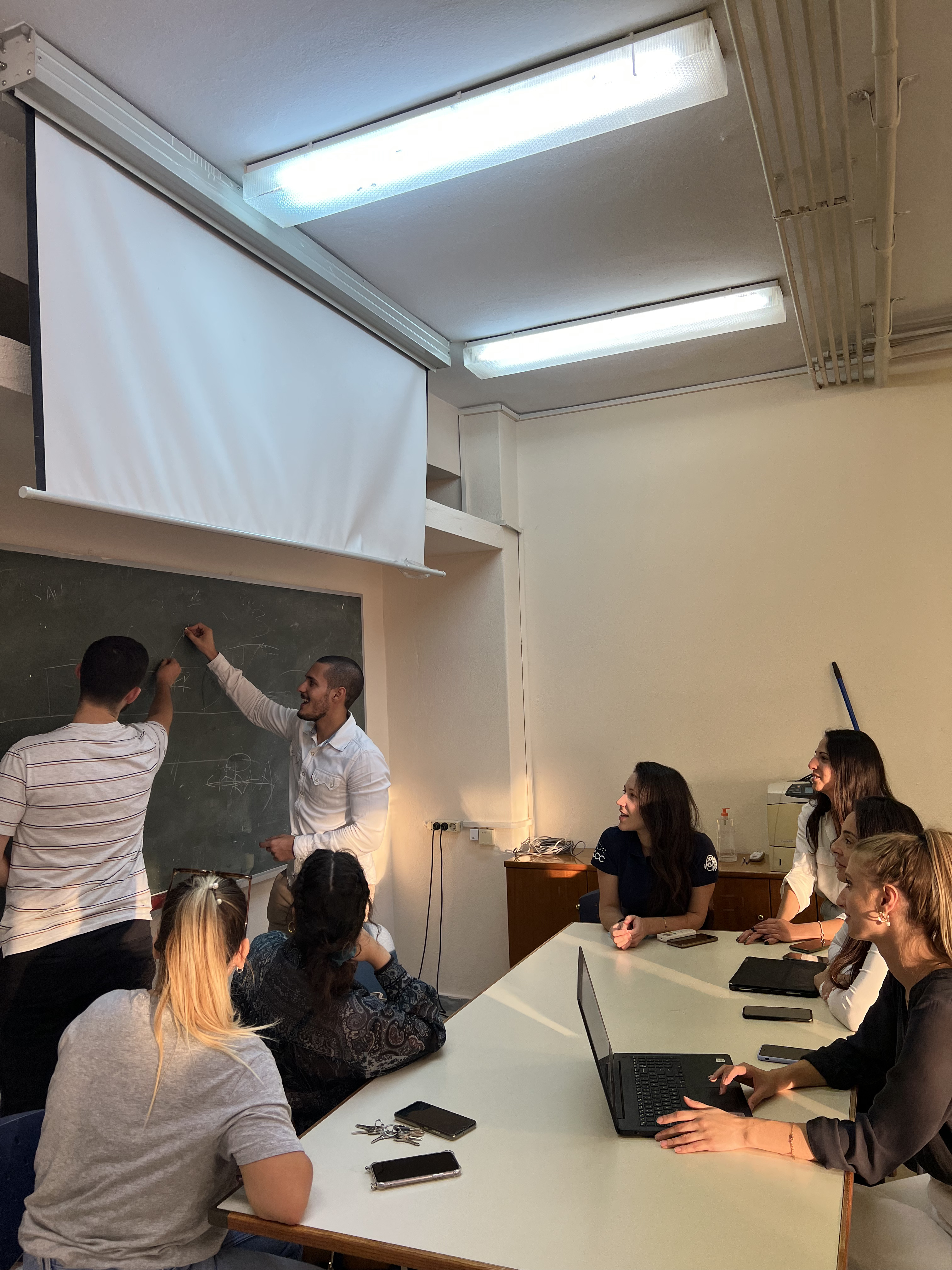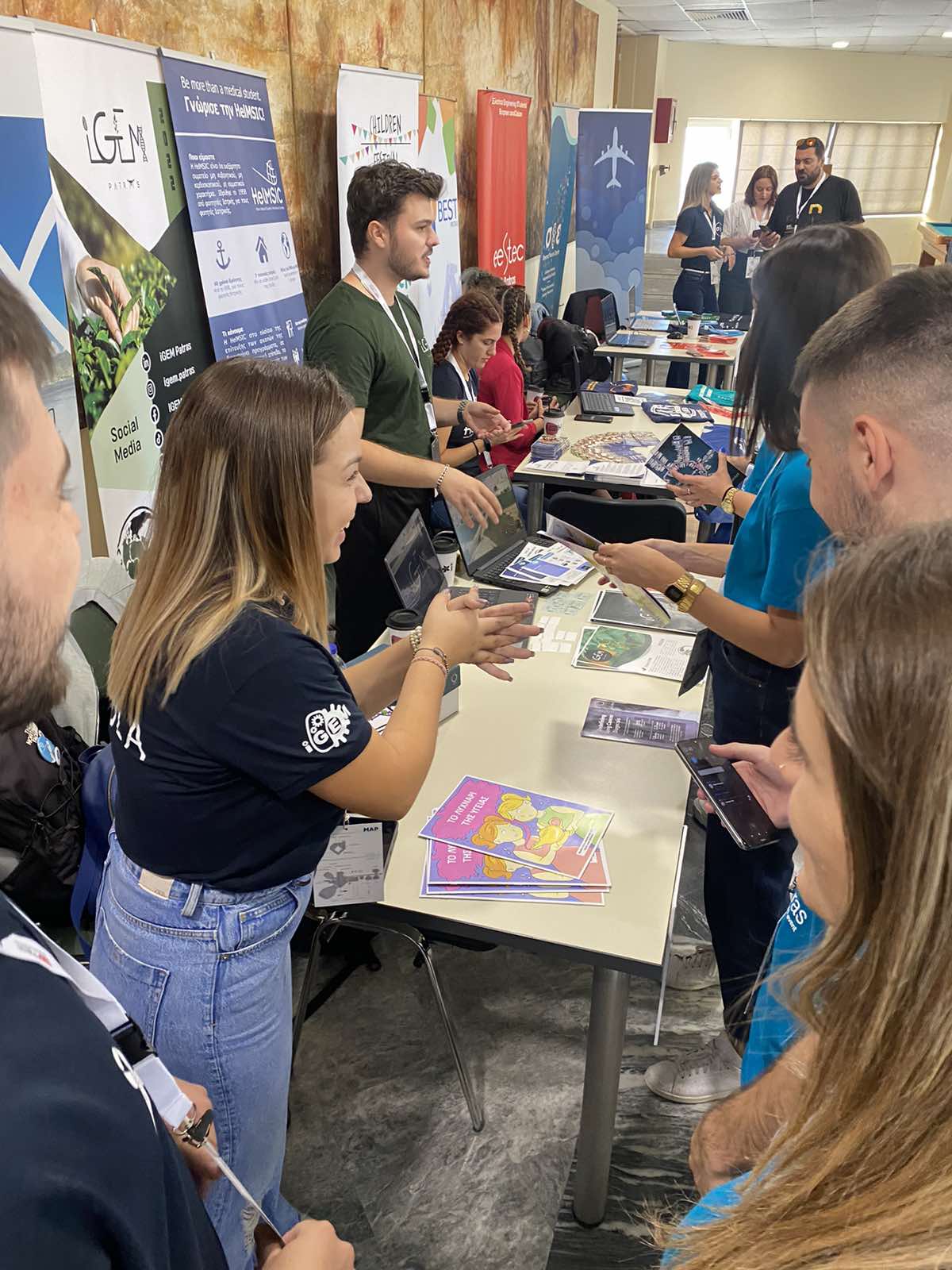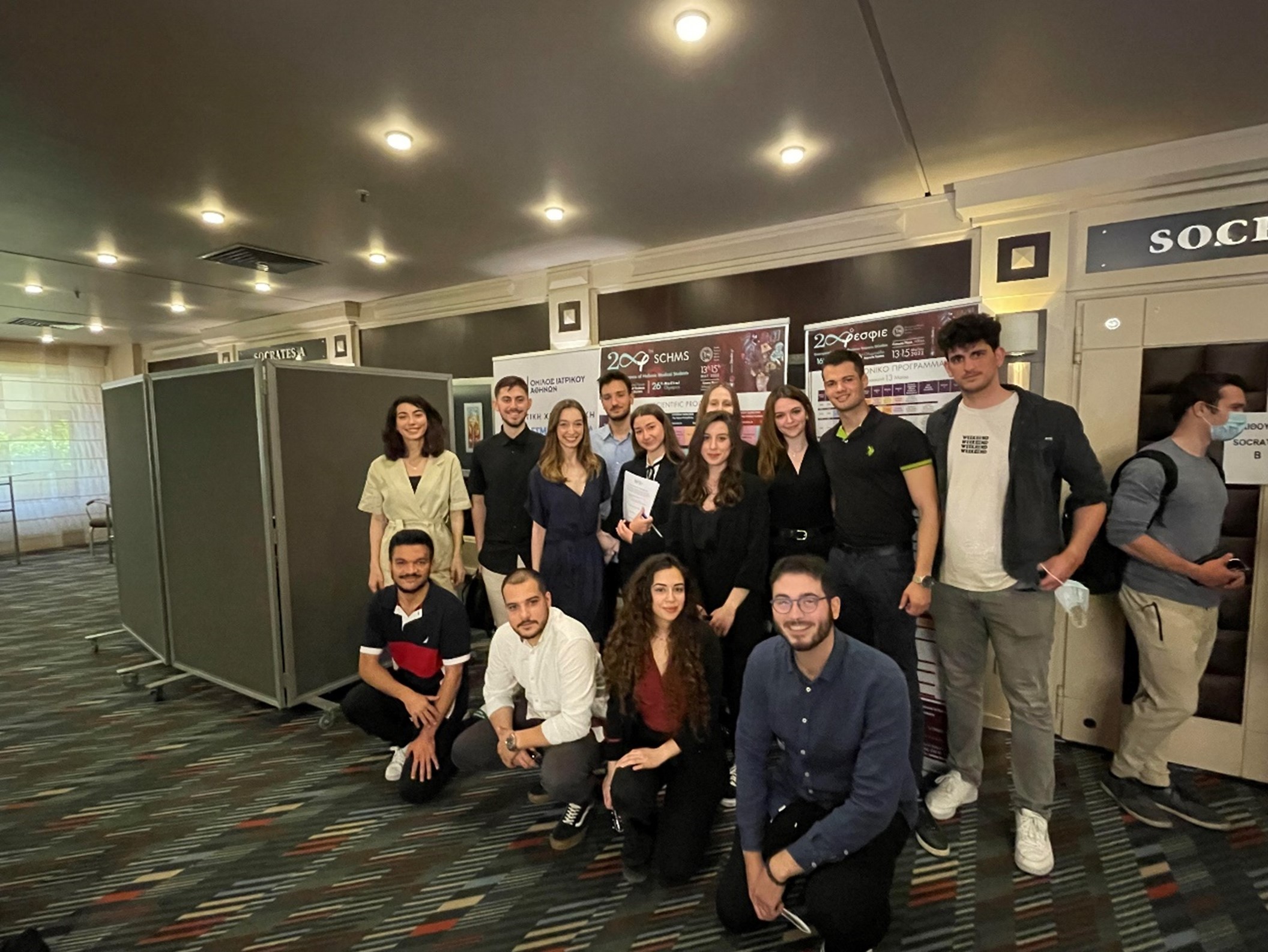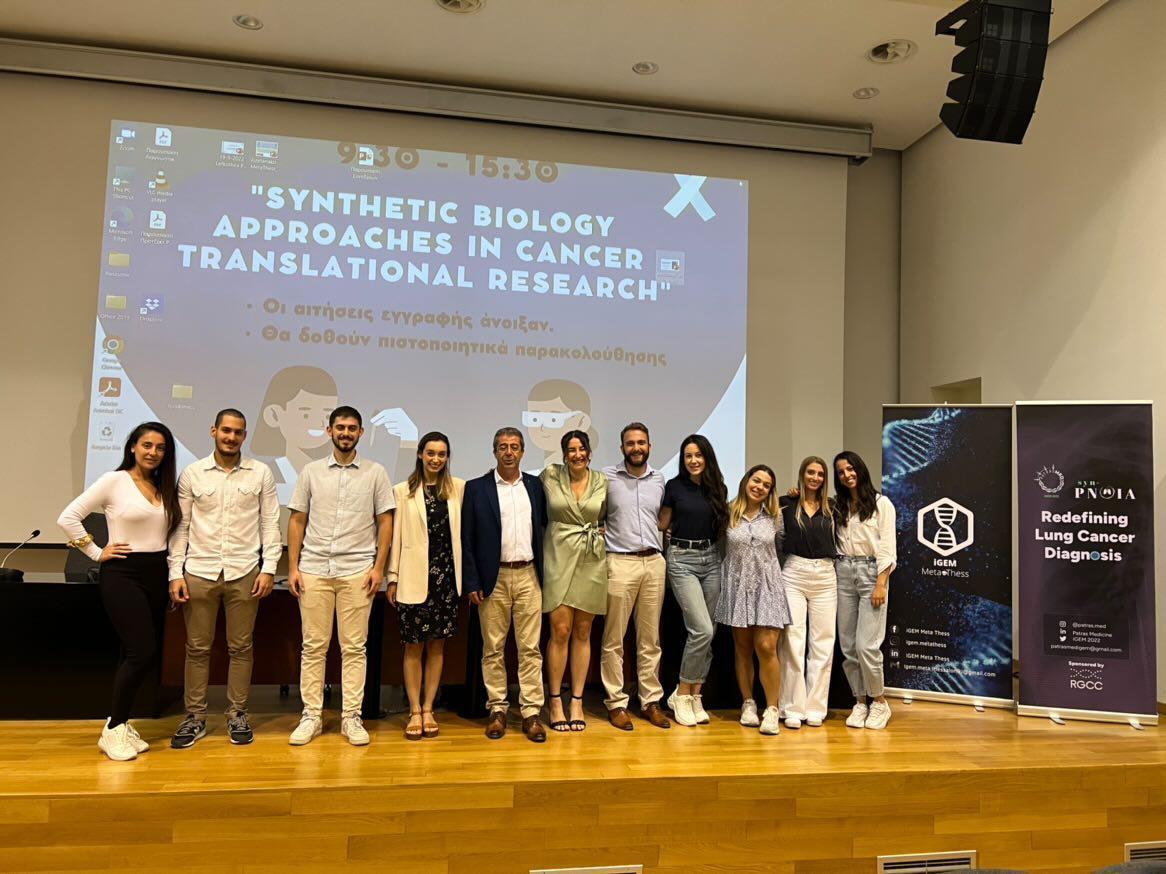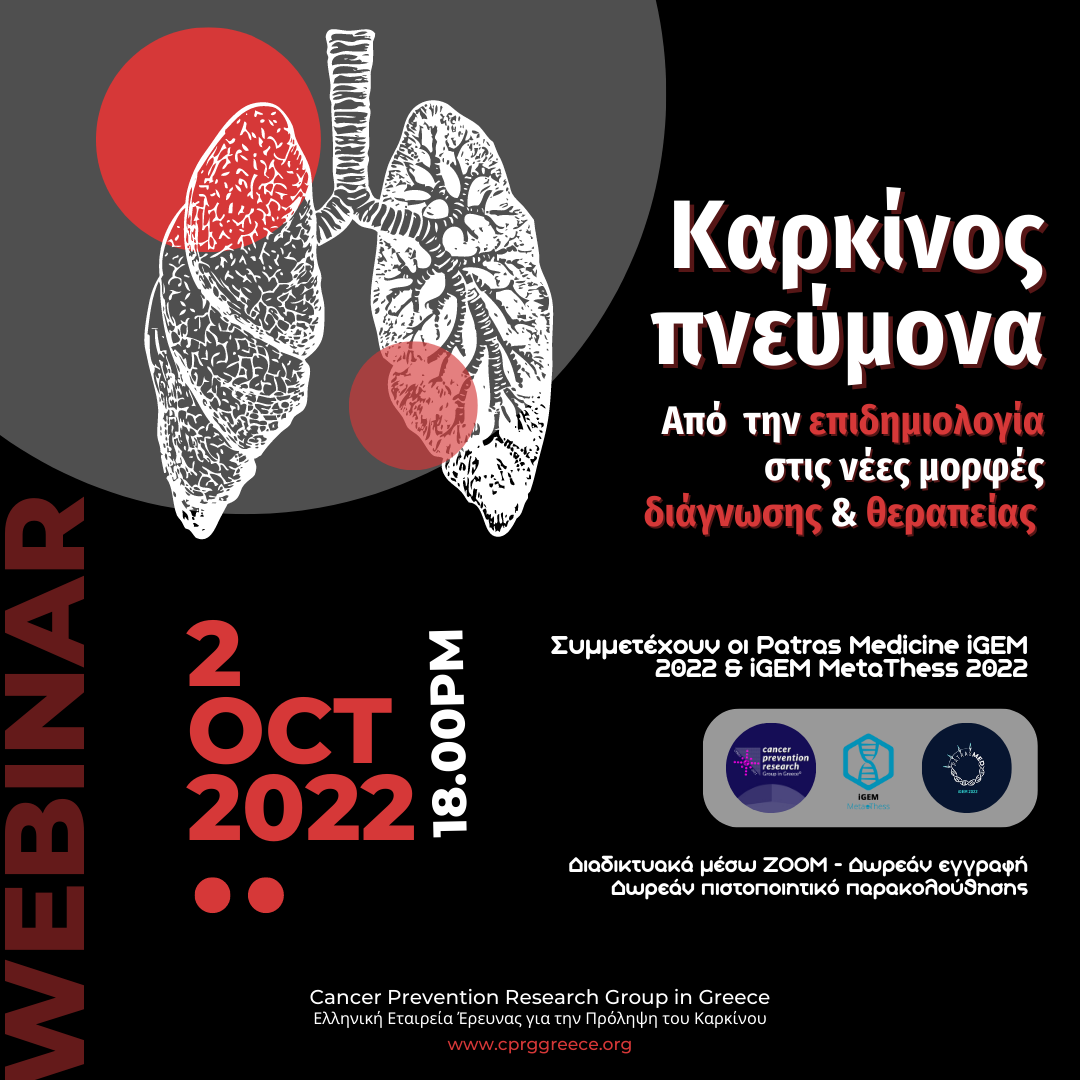Education & Communication
Οne of the most significant institutions promoted by iGEM Competition and, by extension, an integral part of our Human Practices as a team is the interaction and communication of society with science. Seeking to bring the public in touch with Synthetic Biology and syn-PNOIA project, we organized edifying activities aiming to inspire young people and make the public embrace science and get informed about the competition and its prospects.

Intending to attract more and more people to get interested in Synthetic Biology, iGEM Competition, and syn-PNOIA, we designed a sequel of activities including presentations in fairs and even quiz games combining entertainment and educational character.
-
On September 17-18, our team attended the Thessaloniki International Fair 2022. The Thessaloniki International Fair (TIF) is an annual commercial exhibition event of great importance for Greece that takes place at the International Exhibition Center of Thessaloniki. This action took place within the framework of the Partnership since our partners from iGEM MetaThess invited us to the Academia stand.
During our presence, we had the chance to inform the public about our field of research as a group and the problem arising from the late diagnosis of lung cancer.
We distributed brochures to interested parties, verbally informed them about our actions, and showed our comics to younger children who visited the exhibition. In addition to informing the public, we had the honor to tell the former prime minister of our country, Mr. Tsipras, about what we do now and our future goals, who congratulated us on our work.
All the presentations and the public information were done with our partners from the iGEM MetaThess Team since we both have close projects to all extents. Our presence at TIF would not have been possible without them, and we thank them for the invitation.
-
On October 8th, we participated in TEDxPatras, an excellent opportunity to promote our team and stimulate university students' interest in our project.
TED is an international nonpartisan non-profit devoted to spreading ideas, covering almost all topics- including science-while TEDx events help share ideas in communities worldwide. TEDxPatras was organized in Western Greece at the University of Patras, and Patras Medicine was part of it. We presented our project to many young people at this event and further informed them about iGEM Competition. Additionally, we interacted with several university students' voluntary and research groups, participated in educational games, and finally joined a Q&A session where we were asked to explain our project and provide exceptional information about it. Through this event, we had the opportunity to interact with voluntary groups, iGEM teams, and non-profit organizations, exchanging ideas.
-
Thinking of a simple and fun way to communicate science to the audience, we came up with the idea of creating quiz series with multiple choices. Our questions and answers online game, which was also published on our social media, includes various categories and helps the participants check and enrich their knowledge.
Go to Quiz section

Even though Synthetic Biology has kept growing as a scientific field in the last few years and has attracted the interest of more and more young researchers, it is not yet well-known and widely applied in Greece. Our duty as a research group is to communicate and highlight the achievements and opportunities offered by the branch of science we have been studying. For this reason, we intended to spread Synthetic Biology and our idea among the academic community.
-
On May 14th, our team attended the 28th Scientific Conference of Medical Students of Greece. The SCMSG is the crown of the activities of the Scientific Society of Medical Students of Greece. It has been organized continuously since 1994 and is hosted in a different Annex yearly. This year it was organized in Athens, and our team leader had the opportunity to present our idea to medical students and delegates from Medical Schools in Greece and abroad, as well as from other Academies of Health Sciences. Also, it was the first live meeting of the Greek iGEM teams since they were all invited.
-
During our visit to Thessaloniki, we were pleased to attend the seminar organized by our partners from iGEM MetaThess titled "Synthetic Biology approaches in Cancer Translational Research." Throughout the event, outstanding speakers gave discourses about synthetic biology and the institution of the iGEM competition. Then followed the two iGEM groups' presentations regarding explaining our project. The seminar was very engaging, and the participants were willing to ask questions about the presentations and the competition processes as they piqued their interest.
-
On June 16th, our team attended the 2nd Hellenic Conference "Present and Future of Oncology", at the University of Patras. Our Principal Investigator, Ms. Kallergi gave a presentation about the contribution of liquid biopsy in handling patients with cancer. She elaborated on the procedures needed to perform a liquid biopsy, the types of liquid biopsies, and the process from discovery to clinical application. She highlighted that more and more clinical studies focus on liquid biopsy, which is why it is a non-invasive procedure that can provide instrumental data about a person's health. Ms. Kallergi explained that according to the biomarkers detected in the patients' liquids, doctors could gain important information about the type and subtype of cancer and then select the best combination of drugs to target and eliminate cancer more efficiently. The presentation of our PI regarding liquid biopsies as the diagnostic method we have based our project on as a research team was enlightening for the academic audience who attended the conference.

Setting a goal to inspire and motivate young people to engage with Synthetic Biology and understand the prospects of this scientific field in solving global problems, we implemented several educational activities and presentations.
-
Patras Medicine team aims to bring children and adolescents up to 18 years old in contact with synthetic biology. For this purpose, we created 2 board games, and then we made sure to present them in schools, where students had the opportunity to play with them. More specifically
- DNA Runner: This is a board game about the complementarity of DNA bases, which includes various mutagenic factors - such as DNA polymerase or mutagenic agents - that can affect it. So, more playfully, we educate younger children on how DNA is organized inside the cell. Download the instructions
- GENE - US: This is a knowledge board game in the form of questions and answers, which consists of 6 categories of cards and combines knowledge of synthetic biology, anatomy, or physiology while including a more specialized category for the most daring players! Download the instructions
-
Our team has an unwavering goal to fight cancer. As we know, awareness and information are the keys to preventing and fighting this morbidity. Therefore, starting from childhood, we decided to create a comic that would bring children closer to our idea and project. After all, knowledge is power. This is how we get young people into contact with health, wellness, cancer, and iGEMers through a delightful story. Our comic made the rounds of Greek schools, where the children had the opportunity to hear our story and read it. The comic is called the "lamp of health".
Download our comic -
Searching for innovative approaches regarding science communication and public education for Synthetic Biology, we came up with the creation of a dictionary. Our "SynBio Dictionary" contains scientifically and accurately defined terms related to Synthetic Biology that are commonly used in our project. The terms are thoroughly explained and alphabetically sorted so that they can be easily reached by the reader. We also considered implementing this activity as a collaboration in order to enrich our dictionary with even more terms. So we invited 2 more teams to create their extension of our idea, adding more Synthetic Biology related words based on their project.
You can find the SynBio Dictionary here
To familiarize the reader of our website with scientific terms related to synthetic biology, we have included the definition of each term so that someone can learn about it by clicking on that word or phrase. This function is available mainly for laboratory terms contained on the Experiments page. -
In the context of "Education," we visited the Experimental High School of Patras to communicate synthetic biology to young people and students.
In the workshop area of the summer camp and with the supervising professor, Mr. Arlapanos Georgios, we encountered the members of the "Ludo ergo sum" team, and we were allowed to discuss our project and the team's achievements during the competition. However, the most important thing is that our goal was to introduce the students to the concept of synthetic biology. After giving a short presentation, we played the board games we created as a team which, in addition to entertainment, also have an educational role.
We noticed that the students found this way of learning particularly fun; however, during the game, we were allowed to realize any misunderstandings in the instruction manual and the design of the board games. This is due to the experience of Mr. Arlapanos and his team on designing board games since they actively develop blind-friendly board games as a team, receiving outstanding accolades.
Thus, they evaluated our final design, to point out any changes to us, but most importantly, for the students to learn some initial information about synthetic biology.
We learned two things from this first meeting. On the one hand, we can achieve the dissemination of synthetic biology more playfully to a portion of people who are not familiar with it. But on the other hand, we learned firsthand that knowledge is not one-sided and that the two teams within the framework of our cooperation had to learn from each other. We learned about tabletop design from the students' experience and Mr. Arlapanos, and those of us got a little taste of the concept of SynBio.
-
Visiting a High School in Patras, we had the opportunity to present our project and explain in a fun way Synthetic Biology basics through the board games we created. We played the board games for a second time, with a more significant portion of students striving to become upcoming medical students. We also presented the comic that we created as a team to the students, which describes in a more straightforward way how cancer works and how it can affect a person's life.
It is remarkable how interesting they found the activities we prepared for them and paid attention the whole time. Our role that day was not only to disseminate synthetic biology but also to inform future health scientists about the broader problem of lung cancer diagnosis and, by extension, prognosis.
To sum up, through our two meetings at the Experimental High School of Patras, we conclude that as Patras Medicine, we managed to teach the students the concept of complementarity, genetics, and the various variations that occur in the DNA of each person through the DNA Runner board game. On the other hand, we use the question-answer method through the Gene-us board game, the goal of which is for students to retain some of the basic concepts of synthetic biology - we know very well that this way of learning is more efficient. Furthermore, through the comic book "The Lamp of Health," we helped them to understand in a simple but at the same time explanatory way that many of our choices can affect our lives positively or negatively. Finally, we were given the opportunity to contribute to the vocational guidance of young people, considering that we are undergraduate students in the field of health sciences, participating in a synthetic biology competition, and dealing with such a combustive issue.
Overall, from our point of view, we have positively influenced the students, and our meetings have been productive.
-
After we had successfully visited schools and the summer camp, we got impressed by the interest students showed in our project and, most importantly, in Synthetic Biology. Most of them expressed their desire to study further and explore this scientific field. Therefore, we thought integrating Synthetic Biology into their lesson schedule would be helpful. For this reason, one of our team members, our advisor, wrote a whole chapter in which Synthetic Biology is scientifically defined, and further approaches and biosecurity are described in detail. This chapter is a proposed extension for the school book for high school students interested in this field so that they can be taught more about Synthetic Biology during their school life.
Download synthetic biology chapter archive -
Our team wrote a book about Synthetic Biology achievements so far. The first chapter is dedicated to Nobel prize winners on Synthetic Biology issues. This section provides information about scientists awarded since 1958, highlighting their research achievements. Lastly, we have included a timeline of Synthetic Biology's most significant dates and accomplishments, aiming to briefly present the history of this scientific field to the readers.
You can find the Synthetic Biology Scientists here

As part of the science communication session, we scheduled informative events accessible to everyone interested in learning more about iGEM Competition and syn-PNOIA project.
-
Within the Partnership with the iGEM MetaThess team and in our effort to expand into the Science communication part, we jointly organized a webinar. More specifically, the webinar called "A step closer to the gold medal" related to familiarity with bioinformatics and graphic design, will benefit other members of iGEM and other people interested in the above topics. The bioinformatics part was about software tools and was covered by the iGEM MetaThess team members. The corresponding part of graphic design examined the first steps in using adobe illustrator and was encircled by our team. The participants paid particular attention to both parts of the webinar, and at the end of it, we gave them the opportunity ...
-
On September 2nd, we hosted an informative Webinar with title: "Lung Cancer: From Epidemiology to new forms of Diagnosis and Treatment" along with Cancer Prevention Research Group in Greece and our partners, iGEM MetaThess. The webinar had a great response and success, as approximately 300 people attended it. Young scientists have formed their presentations so that specialists and the general public can come into contact with topics such as pathophysiology, causes, epidemiology, primary symptoms, and diagnostic and therapeutic approaches to lung cancer in an understandable way. In this context, our team introduced project syn-PNOIA to the audience, emphasizing that late diagnosis of the disease can be faced based on Synthetic Biology. Among the speakers were administrative members of Cancer Prevention Research Group, doctors, associate professors of Chemistry, biologists, hygienists, health visitors, and undergraduate and postgraduate students from both iGEM teams, who gave engrossing speeches raising public awareness.

Finally, we sought effective ways to disseminate our team's research through iGEM Competition and introduce Synthetic Biology to the audience. From our interaction with the public, we received positive reviews and genuine interest in our project, and we also enjoyed our journey in iGEM Competition 2022.
-
Podcasts have lately been an effective, intimate, and popular way to reach out, especially to young people. Developing our podcast series named "The SynBio Voice" we aim to raise public awareness about our team, Syn-Pnoia project, and iGEM Competition and, most importantly, bring science and society together. To achieve this, we included informative episodes related to health issues concerning our topic, lung cancer, and analyzed the social and entrepreneurial aspects of the competition. Last but not least, we interviewed guest iGEM and award-winning research teams in different scientific fields who shared their experiences and passion for science, inspiring the audience. Our series is easily accessible on Spotify.
-
In promoting our team and interacting with the public, we used social media that are extremely popular, provide immediacy and contribute to building a good relationship and bonding with the audience. Developing our profile on social media platforms (Instagram, Facebook, Twitter, LinkedIn) not only increased the popularity of the team and our project, but we also organized several activities.
- For instance, we created quizzes and fun fact series to make Synthetic Biology and our topic accessible to everyone in a fun way.
- We also designed informative posts about lung cancer basics and our technique, as well as posts related to Synthetic Biology, such as The SynBio timeline and Nobel Prize on Synthetic Biology issues winners series.
- Moreover, Social Media has been a valuable tool for developing and participating in several collaboration invitations with other iGEM teams.
-
As part of our science communication, we wrote an informative article to promote our team and the project we are involved in. Our article has been published by many websites and journals, providing the opportunity even to people who are not experts to unearth more about Synthetic Biology and lung cancer and meet our research group and our innovative diagnostic approach to the disease.
Furthermore, regarding the informative webinar about lung cancer we organized with CPRG and iGEM MetaThess team, our event got published and advertised on a website gaining excellent reviews for its content, coordination, and speakers.

-
4. Medical Applications of Synthetic Biology:
Tissue Engineering
Diagnostics
Gene therapy
Vaccines
All of the above
-
1. Cancer is a disease caused when:
There is a chromosomal rearrangement
The organism is infected by pathogens
Cells divide uncontrollably
All of the above
2. Cancerous tumors spread into, or invade, nearby tissues and can travel to distant places in the body to form new tumors. This process is called:
Tumorigenesis
Leukemia
Metastasis
Oncogenesis
3. How may normal cells become cancer cells?
Normal 🡪 Hyperplasia 🡪 Dysplasia 🡪 Cancer
Normal 🡪 Ysplasia 🡪 Hyperplasia 🡪 Cancer
5. Which type of cancer was the most common in 2021?
Breast cancer
Lung cancer
Prostate cancer
Colon and rectum cancer
-
4. What hormone does small cell lung cancer mainly produce as an ectopic site of it?
ADH
Epinephrine
Noradrenaline
Cortisol
-
2. When cancer has not spread outside the lungs it is called:
localized NSCLC
regional NSCLC
metastatic lung cancer
3. Which of the following is true about adenocarcinoma?
Men are more prone than women to develop this cancer.
It is the most common lung cancer type for smokers.
It’s the most common cancer among people who never smoked.
4. Which of the following is often found in the center of the lung next to an air tube?
Squamous cell carcinoma
Adenocarcinoma
Large cell carcinoma
-
Which cancer biomarker is related to colorectal tumors?
BRCA1, BRCA2
EGFR
Philadelphia Chromosome (BCR/ABL)
Which cancer biomarker is related to lung tumors?
ALK; EGFR; KRAS
PML/RAR alpha, TPMT
FIP1L1-PDGRF alpha, PDGFR
-
What is a probe?
Chemically synthesized DNA
Purified DNA
Fragmented DNA duplex
Either purified or synthesized single stranded DNA
Why is a probe labeled?
Improve visibility
Improve stability
Improve location identification
Improve binding capability
Which of the following probe is generally used for screening cDNA libraries?
Oligonucleotide probes
DNA probe
RNA probe
-
The procedure by which DNA gel is transferred to a membrane is termed as:
blotting
cloning
injection
Which of the following does not affect the formation of hybrid DNA?
Ionic strength
Temperature
Pressure
Homologous DNA
Which of the following is not termed as hybridization?
DNA from male and female of same species
DNA and mRNA
DNA and cDNA
DNA from different species



